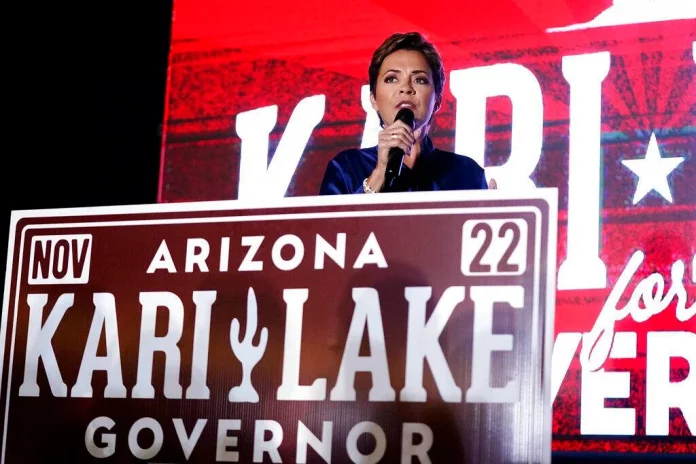
A tight race for Arizona governor is within the margin of error, according to a new survey from Scott Rasmussen’s RMG Research, and incumbent U.S. Sen. Mark Kelly, D-AZ, holds a 7-point lead over Republican challenger Blake Masters. On hot-button issues such as the economy, Arizonans took positions Rasmussen believes could further benefit the pair of Republicans.
Asked to name the top issue that would most influence their vote, 47% selected inflation and the economy – far and away the dominant concern. The next nine issues combined accounted for the remaining 53%.
“When people’s pockets are getting pummeled, that hurts the party holding the White House,” Rasmussen said. “This poll reveals Republicans could exploit that advantage and several other issues.”
The survey of 750 likely voters was conducted from August 16-22 and has a margin of error of +/- 3.6 percentage points.
In the gubernatorial showdown, it shows Republican Kari Lake leading Democrat Katie Hobbs, 46% to 44%, with a combined 9% unsure or supporting another candidate. Kelly leads Masters, 50% to 43%, in the U.S. Senate race.
Abortion was the top election concern selected by 12% of poll respondents, good for third place but still far behind economic worries. Democrats have been hoping to use abortion as a wedge issue following the Supreme Court’s overturning of Roe v Wade this summer. The poll indicates this could be a challenge in Arizona.
Asked their position regarding a candidate who “voted to make abortion legal up until the moment of birth,” 48% said they would be less likely to vote for such a person, while 41% said they would be more likely to support that candidate.
Mark Kelly voted for an unsuccessful U.S. Senate proposal that would have created a federal abortion law even more permissive than the “abortion on demand” standard of the Roe decision. The bill would have voided even some state-level abortion restrictions that had still been compliant with Roe. Abortion opponents announced they would use this vote in an advertising blitz criticizing Kelly for “voting in favor of abortion-on-demand, up until birth…”
Regarding the biggest issue, 63% believe the economy is in a recession, and 48% reported their finances were getting worse. And a clear majority were pessimistic about the future: 59% said the overall economy is getting worse, and 36% selected the “much worse” characterization.
Rasmussen said responses to at least three other poll questions tipped the scales toward traditional Republican positions.
Regarding general policy preferences, 52% combined said they preferred a candidate who either supported Donald Trump’s policies or those of a “more traditional Republican.” This was compared with 44% who said they preferred either a traditional Democrat or one aligned with the views of U.S. Sen. Bernie Sanders (I-VT).
The building of a border wall between Arizona and Mexico was favored by 62%. “Immigration and border security” was listed by 13% of poll respondents as their top election issue, good for second place, just ahead of abortion.
Requiring voters to show photo identification before casting a ballot was also popular. Asked about a candidate who opposed such a measure, 57% reported they would be less likely to support that politician. This appears to be another issue where Kelly’s Senate votes and Arizona’s opinion are on different sides.
Asked if they would be more or less likely to vote for a candidate who increased federal taxes by $430 billion, 57% said they would be less likely to vote for that person, versus 29% more likely.
In August, Kelly voted in favor of the so-called Inflation Reduction Act (IRA), a Democratic proposal that a Reuters report described as “$430 billion in new spending along with raising more than $740 billion in new revenues.”
But the IRA might also include a bright spot for Democrats such as Kelly, as 51% said they would be more likely to vote for a candidate who voted for “$300 billion in new government spending on clean energy projects.” The IRA provides $300 billion in spending on so-called “clean energy” projects, including subsidies for weather-restricted wind and solar power systems.
Republished with the permission of The Center Square.














